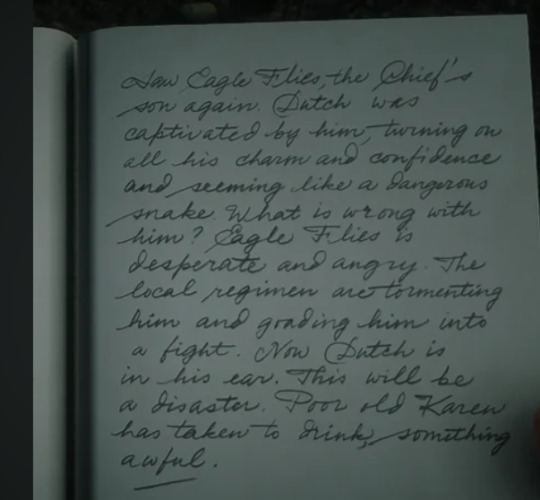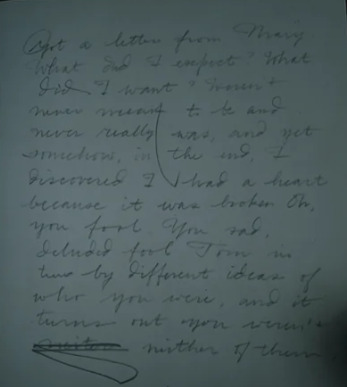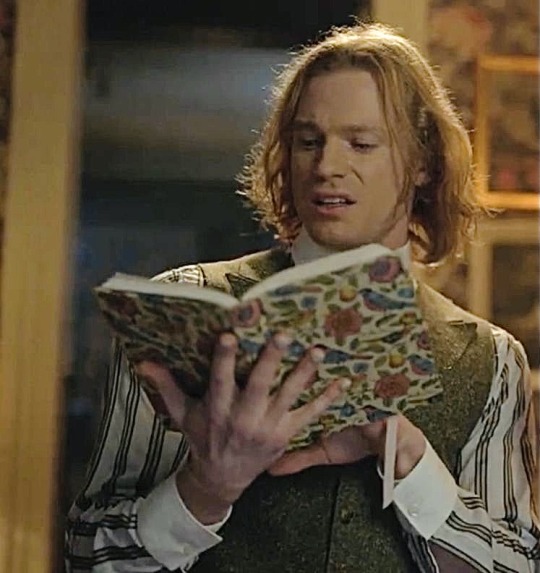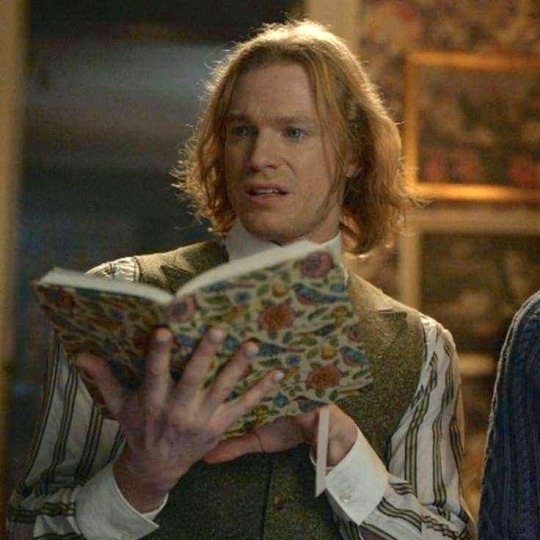Text
Excuse me while I go cry in the shower...
watching Arthur's handwriting get messier as time goes on hurts me more than anything.
usual handwriting

and then towards the end of chapter 6...

never fails to make my heart shatter
4K notes
·
View notes
Text
Me to my sister literally 24/7

it’s just a silly little cowboy game right? RIGHT?
5K notes
·
View notes
Text
"Written kisses never arrive at their destination; the ghosts drink them up along the way."-Frank Kafka, Letters to Milena
6 notes
·
View notes
Text
Even worse when they didn't even tag it.
When you’re in the middle of a fic and realise you’ve missed a very critical tag


57K notes
·
View notes
Text
I'm still so pissed at this.
I love watching early seasons of supernatural and thinking about how it started as a horror ghost hunting show with a target audience of tough guy blue collar men and their wives drinking beer after work and it ended with little gay 12 year olds screaming about how a gay angel went to super mega hell while a CAR went to heaven.
20 notes
·
View notes
Note
Just gonna leave this here....
heyo- a friend is trying to get me to read 1984 because 'it'll totally change your worldview on government and anarchism', but i've heard some bad things about the book itself/george orwell. should i read it? is there anything similar/more theorylike i could read instead?
thank you! your blog rocks <3 <3
Go ahead and read it if you want. It's a classic entry into the genre of dystopian science fiction and it has spawned many imitators since its publication. However, if you're looking for actual theory or history, you won't find it there. I would recommend Pat Sloan's "Soviet Democracy" or Anna Louise Strong's "The Soviets Expected It" and "The Stalin Era" if you want real accounts of the Soviet Union under Stalin.
Orwell never actually visited the Soviet Union, and 1984 is based not on his own personal experience with the country but instead on Western propagandistic views of the country and his own displeasure towards the fact that during World War II, when the UK and the USSR were allies, the British press was much less keen to publish anti-Soviet works right at the same time he was trying to get Animal Farm published. You must also understand that his wife worked for the UK's Ministry of Information as a censor and Orwell himself worked at the BBC producing wartime propaganda. It is not a coincidence then that the main character of 1984, Winston Smith, is a censor and propaganda official working with the fictional "Ministry of Truth" and eventually finding himself battling against state control of information.
Ironically, after stylizing himself so much as a defender of liberty and freedom against the "totalitarianism" of the time, Orwell would write up a list of alleged subversive writers for the British Information Research Department, a secret department tasked with publishing anti-communist propaganda during the Cold War. Some of this propaganda would end up being a comic strip version of Orwell's Animal Farm. There is a significant throughline in both Animal Farm and 1984 that clearly betrays Orwell's political views. In both works, the proletariat are depicted as nothing more than idiots and sheep who follow the orders of anyone willing to give them work and are easily duped by intellectuals. In 1984, he phrases it as the proletariat being more "free" simply because they're so insignificant as to warrant no government surveillance.
In 1984, the fictional society of "Oceania" is a far cry from a dictatorship of the proletariat. The proletariat have no political power, they all live in slums and are mollified by bread and circuses. How is the building of the slums organized? Where does the money go when one buys their bread? We are not told anything about this except that the process is slow and inefficient. The story isn't interested in material concerns. The "proles" do their work, we are told, but we are never shown much more than informal labor. We don't know who is telling them to work or how they are getting paid. The "Outer Party" is supposedly the white collar "middle" class of Oceanic society, but despite the amount of focus the story has on this class, we are never shown a single Party member managing a workplace or poring over receipts. We are to believe that the proletariat are simultaneously left to their own devices and unmolested by the state, while also completely under the control of the state through invisible mechanisms that are never elaborated upon. While Winston will complain endlessly about his own quality of life, not once does a single prole gripe about their job. The cost and quality of goods come up sporadically and only to illustrate the deterioration of English society under Party rule, never to illustrate any material basis of said rule.
Even more at the periphery are the colonized peoples (although never described as such) within the war-torn areas never under the permanent control of any world power. All three of the global superpowers are said to be in a constant struggle over the control and enslavement of these super-exploited workers and the resources of their nations, which are said to make up a significant proportion of the material resources of each superpower, however at the same time they are not considered to be part of the proletariat and are dismissed as entirely disposable and unnecessary for the maintenance of any of these superpowers. To Orwell, it seems, colonialism is simply a thing the colonizers do out of habit and not a phenomenon with an actual material basis or actual material effects. In turn, the colonized are not actual people who might take umbrage with the constant conflict imposed upon them, but rather chattel that is perfectly content to be traded back and forth among the colonizers.
The importance of the middle class in society is a recurring theme in 1984. For example, the Trotsky-esque political treatise Winston reads within the story, "The Theory and Practice of Oligarchical Collectivism", begins with a twist on Marxist historical materialism - while it recognizes the role of class conflict in human history, it asserts a transhistorical narrative of the eternal existence of three separate classes within society since "Neolithic times": the upper, middle, and lower classes. It is then asserted that it is the middle and only the middle class that is ever revolutionary, and that when it appeals to the lower classes it does so only to use them as a cudgel against the upper classes and never out of a genuine concern for their wellbeing. The treatise, idealistic as it is, provides little definition of these classes. The lower classes are described as "crushed by drudgery" and in a constant state of servitude that places them incapable of achieving political consciousness, something reserved solely for the upper and middle classes. The upper class is defined simply as the "directing" class, and the middle as the "executive" class. The identity of the middle class within Oceania is made clear: they are the "Outer Party", the white collar intelligentsia and managerial class which Winston and Julia belong to. One must assume Orwell viewed himself as a member of the middle class as well. If this section of the book is at all reflective of Orwell's own views (and to be clear no part of the book refutes this outlook,) then Orwell's rejection of Marxism-Leninism is rooted in his view of the vanguard party as simply a mechanism for the intelligentsia and bureaucrats to trick the stupid proles into overthrowing the bourgeoisie, rather than as a genuine means of proletarian liberation.
The politics of the Party are entirely idealistic in nature. "Big Brother" dominates through control of ideology and speech. The goal of Ingsoc, the ruling ideology of Oceania, is to make dissent impossible through the thorough alteration of language and the removal of words which could represent ideas that are not in line with Ingsoc, a process called "Newspeak". It is explicitly stated, however, that none of this ideological control is directed towards the proletariat, which is said to make up 85% of Oceania's population. The proles are not expected to learn Newspeak, they are not monitored by the telescreens, because as is stated quite frankly in the book, "the masses never revolt of their own accord, and they never revolt merely because they are oppressed." That this line is given by the villain of the story is unimportant, because the story never refutes it.
While Winston routinely repeats his belief that "hope lies in the proles", he is consistently met with scenes that challenge his faith whenever he winds up interacting with the proletariat. His conversations with proles reveal their total lack of concern with politics or history. He hears a crowd erupt into chaos and briefly hopes it's the proletarian uprising he is waiting for, only to find it's simply a riot over consumer goods. They are more than once compared to animals. While it is said in exposition that intelligent members of the proletariat who might end up fomenting dissent are eliminated, this is never actually depicted. We don't see Winston meeting with a single intelligent and politically conscious prole. The most intelligent prole he meets turns out to be a secret member of the "Thought Police". And so, the concept remains theoretical.
Winston is depicted as an ardent materialist, desperately defending the notion of external reality against deranged idealists who believe that through control of thought, control of reality becomes possible. But the world he lives in is not material. It is fictional, of course, but more than that, the fictional world described operates on idealistic principles even from Winston's own perspective. Winston's worldview is a faith based one, appealing not to any material basis for liberation but purely to emotion. It is love and the spirit of humanity that is the basis of freedom, and material freedom springs forth from it. Anyone who thinks otherwise is merely a trickster trying to control the masses.
Orwell rejected the material basis of history because he rejected the idea of a revolution on a material basis. To him, the revolution must be an ideological one, and the problem lie not in how society and the economy are organized but in the existence of hateful "authoritarian" ideologies governing the world. He believed the material basis was already here, that industry alone was the solution to material inequality, and so we must concern ourselves now only with the idea of equality and freedom, and from an abstract and universal viewpoint to boot. It is intolerable to him that a revolution be fought against an actual enemy in the real world. The problem is not that the capitalists are in control of the means of production, the problem is that the workers are too stupid to disobey them. A real revolutionary class would spontaneously throw off its own shackles through thought alone. It doesn't matter that Orwell was a lackey and a snitch, because in his mind he was freer and smarter than everyone else.
The bravery of Winston Smith was in recognizing the existence of a material reality that lies and propaganda could never destroy even while being tortured into believing such absurd notions as "two plus two equals five". But Orwell was never tortured into any of his incorrect beliefs. His incorrect beliefs stem purely from accepting the official narrative that he was fed and refusing to investigate its veracity for himself. Orwell's writing was used as propaganda against the designated enemy of the UK throughout the Cold War, adapted countless times in the forms of radio plays, TV shows, movies, and comic books. He never made an effort to actually travel to the Soviet Union to find out if what he was told about the country was true. All the other upper middle class "left-wing" intellectuals he hung out with seemed to be just as concerned as he was with the rising tide of "totalitarianism" and the supposed excesses of the Soviet Union, so why shouldn't he agree? He was in this regard no different than the Western "socialists" of the modern day who have no shortage of vitriol towards China or North Korea. Yes, he might performatively rail against chauvinism and nationalism, but only enough to ensure that he wouldn't be seen as a conservative. He still knew in his heart that his country was surely better than those barbarous communists in the East.
Yes Orwell was sexist and homophobic, and despite his best efforts he remained plagued by racist and antisemitic attitudes, but in addition to all that his books promulgated a view of the world entirely in line with British bourgeois values, which is why they were so eagerly used as propaganda by the British government. The Nazis were bad and the Soviets were bad because they were both authoritarian, and the differences between them were negligible and unworthy of mention. The references 1984 makes to the shifting alliances in Oceania, "we are at war with Eurasia" becoming "we are at war with Eastasia" and vice-versa, are most likely allegories for the shifting alliances of Britain at the time, how they viewed the Soviets as an enemy before the war, as an ally during the war, and as an enemy again once the war was over. Orwell viewed himself as above all of this simply because his view of the Soviets never changed at any point throughout this.
225 notes
·
View notes
Text

5K notes
·
View notes